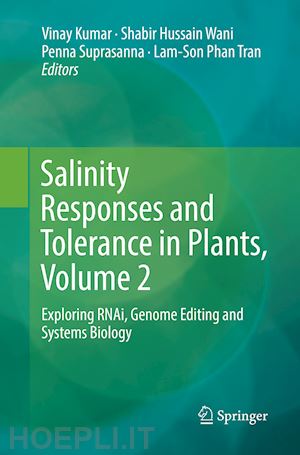Dr. Vinay Kumar is an Assistant Professor at the Post-graduate Department of Biotechnology, Progressive Education Society’s Modern College of Arts, Science and Commerce, Ganeshkhind, Pune, India and a Visiting Faculty at the Department of Environmental Sciences, Savitribai Phule University, Pune, India. He obtained his Ph.D. in Biotechnology from Savitribai Phule Pune University (Formerly University of Pune) in 2009. For his Ph.D., he worked on metabolic engineering of rice for improved salinity tolerance. He has published 32 peer reviewed research/review articles and contributed 13 book chapters in edited books published by Springer, CRC Press and Elsevier. He is a recipient of Government of India’s Science and Engineering Board, Department of Science and Technology (SERB-DST) Young Scientist Award in 2011. His current research interests include elucidating the molecular mechanisms underlying salinity stress responses and tolerance in plants. His research group is engaged in assessing the individual roles and relative importance of sodium and chloride ions under salinity stress in rice and has made significant contributions in elucidating the individual and additive (under NaCl) effects of sodium and chloride ions.
Dr. Shabir H. Wani is an Assistant Professor cum Scientist at the Mountain Research Centre for Field Crops, Khudwani Sher-e-Kashmir University of Agricultural Sciences and Technology of Kashmir, Srinagar, Jammu and Kashmir, India. He has published more than 100 papers/chapters in peer reviewed journals, and books of international and national repute. He is Review Editor of Frontiers in Plant Sciences, Switzerland. He is editor of SKUAST Journal of Research, and LS: An International journal of Life Sciences. He has also edited Ten books on current topics in crop Improvement published by CRC press, Taylor and Francis Group, USA and Springer in 2015 and 2016. His PhD research fetched the first prize in North zone at National level competition in India. He is the fellow of the Linnean Society of London and Society for Plant Research, India. He received various awards including Young Scientist Award (Agriculture) 2015, Young Scientist Award 2016, Young Achiever award 2016 by various prestigious scientific societies. He has also worked as a Visiting Scientist in the Department of Plant Soil and Microbial Sciences, Michigan State University, USA for the year 2016-17 under the Raman Post Doctoral Research Fellowship programme sponsored by University Grants Commission, Govt. of India, New Delhi. He is a member of the Crop Science Society of America.
Dr. P. Suprasanna (Ph.D. Genetics, Osmania University, Hyderabad) is a Senior Scientist and Head of Plant Stress Physiology & Biotechnology Group in the Nuclear Agriculture & Biotechnology Division, Bhabha Atomic Research Centre, Mumbai, India. Dr. Suprasanna made significant contributions to crop biotechnology research through radiation induced mutagenesis, plant cell and tissue culture, genomics and abiotic stress tolerance. His research on radiation-induced mutagenesis and in vitro selection in sugarcane yielded several agronomically superior mutants for sugar yield and stress tolerance. He has made intensive efforts to apply radiation mutagenesis techniques in vegetatively propagated plants through collaborative research projects. He is actively associated with several national and international bodies (IAEA, Vienna) in the areas of radiation mutagenesis, plant biotechnology and biosafety. He is the recipient of the “Award of Scientific & Technical Excellence” by the Department of Atomic Energy, Govt. of India and is the Fellow, Maharashtra Academy of Sciences, Andhra Pradesh Academy of Sciences, Telangana Academy of Sciences, Fellow, Association of Biotechnology, and Faculty Professor, Homi Bhabha National Institute, DAE. Dr. Suprasanna has published more than 225 research papers/ articlesin national & international journals and books. His research is centred on molecular understanding of abiotic stress (salinity, drought and arsenic) tolerance, and salt-stress adaptive mechanism in halophytic plants. The research group led by him on crop genomics has successfully identified novel microRNAs, early responsive genes besides validating the concept of redox regulation towards abiotic stress tolerance and plant productivity.
Dr. Lam-Son Phan Tran is Head of the Signaling Pathway Research Unit at RIKEN Center for Sustainable Resource Science, Japan. He obtained his M.Sc. in Biotechnology in 1994 and Ph.D. in Biological Sciences in 1997, from Szent Istvan University, Hungary. After doing his postdoctoral research at the National Food Research Institute (1999-2000) and the Nara Institute of Science and Technology of Japan (2001), in October 2001, he joined the Japan International Research Center for Agricultural Sciences to work on the fun











